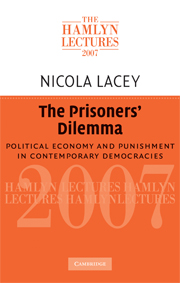Preface
Published online by Cambridge University Press: 31 January 2011
Summary
It is generally agreed that the humanity, fairness and effectiveness with which governments manage their criminal justice systems is a key index of the state of a democracy. But constraints on the realisation of democratic values and aspirations in criminal justice are markedly variable across time and space. In the last three decades, in the wake of both increases in recorded crime and a cluster of cultural and economic changes, British criminal justice policy has become increasingly politicised: both the scale and intensity of criminalisation and the salience of criminal justice policy as an index of governments' competence have developed in new and, to many commentators, worrying ways. These developments have been variously characterised as the birth of a ‘culture of control’ and a tendency to ‘govern through crime’; as a turn towards an ‘exclusive society’ focused on the perceived risks to security presented by particular groups. Across the Atlantic, we witness the inexorable rise of the US prison population, amid a ratcheting up of penal severity which seems unstoppable in the face of popular anxiety about crime. In the context of globalisation, the general, and depressing, conclusion seems to be that, notwithstanding significant national differences, contemporary democracies are constrained to tread the same path of ‘penal populism’, albeit that their progress along it is variously advanced. A substantial scaling down of levels of punishment and criminalisation is regarded as politically impossible, the optimism of penal welfarism a thing, decisively, of the past.
- Type
- Chapter
- Information
- The Prisoners' DilemmaPolitical Economy and Punishment in Contemporary Democracies, pp. xv - xxPublisher: Cambridge University PressPrint publication year: 2008

